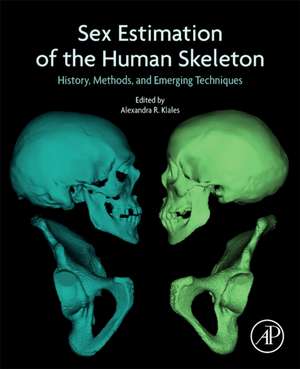Sex Estimation of the Human Skeleton: History, Methods, and Emerging Techniques
Editat de Alexandra R. Klalesen Limba Engleză Paperback – 31 mai 2020
Divided into three main sections, this reference text first provides an introduction to the book and to sex estimation overall, including a history, practitioner preferences, and a deeper understanding of biological sex. The second section addresses the main methodological areas used to estimate sex, including metric and morphological methods, statistical applications, and software. Each chapter topic provides a review of older techniques and emphasizes the latest research and methodological improvements. Chapters are written by practicing physical anthropologists and also include their latest research on the topics, as well as relevant case studies. The third section addresses current considerations and future directions for sex estimation in forensic and bioarchaeological contexts, including DNA, secular change, and medical imaging Sex Estimation of the Human Skeleton is a one-of-a-kind resource for those involved in estimating the sex of human skeletal remains.
- Provides the first comprehensive text reference on sex estimation, with historical perspectives and current best practices
- Contains real case studies to underscore key estimation concepts
- Demonstrates the changing role of technology in sex estimation
Preț: 603.38 lei
Preț vechi: 752.43 lei
-20% Nou
Puncte Express: 905
Preț estimativ în valută:
115.49€ • 125.49$ • 97.08£
115.49€ • 125.49$ • 97.08£
Carte tipărită la comandă
Livrare economică 14-28 aprilie
Preluare comenzi: 021 569.72.76
Specificații
ISBN-13: 9780128157671
ISBN-10: 0128157674
Pagini: 424
Dimensiuni: 191 x 235 x 24 mm
Greutate: 0.72 kg
Editura: ELSEVIER SCIENCE
ISBN-10: 0128157674
Pagini: 424
Dimensiuni: 191 x 235 x 24 mm
Greutate: 0.72 kg
Editura: ELSEVIER SCIENCE
Public țintă
Primary: Forensic Anthropologists, as well as Students and Academicians in Forensic Anthropology, Human Osteology, and Skeletal Biology.Secondary: Physical Anthropologists, Bioarchaeologists, Skeletal Biologists, Pathologists, Death Investigators, and other Forensic Scientists.Cuprins
Part 1 Introduction to sex estimation
1. A history of sex estimation of human skeletal remains
2. Practitioner preferences for sex estimation from human skeletal remains
3. Applications of sex estimation in paleoanthropology, bioarchaeology, and forensic anthropology
4. The confusion between biological sex and gender and potential implications of misinterpretations
5. Effect of sex misclassification on the skeletal biological profile
Part 2 Methods for sex estimation
Section A Morphological
6. Pelvis morphology
7. Adult sex estimation from cranial morphoscopic traits
8. Analyses of the postcranial skeleton for sex estimation
9. Parturition markers and skeletal sex estimation
Section B Metric
10. Dentition in the estimation of sex
11. Metric methods for estimating sex utilizing the pelvis
12. Sexual dimorphism variation in Fordisc samples
Section C Statistics & databases
13. Statistical and machine learning approaches to sex estimation
14. Subadult sex estimation
15. DSP: A probabilistic approach to sex estimation free from population specificity using os coxae measurements
16. MorphoPASSE: Morphological pelvis and skull sex estimation program
Part 3 Current considerations/topics
17. Factors of population variation in sex estimation methodology
18. Secular change
19. The effects of skeletal asymmetry on accurate sex classification
20. Cognitive bias in sex estimation: The influence of context on forensic decision-making
21. Sex determination using DNA and its impact on biological anthropology
22. The application of medical imaging to the anthropological estimation of sex
1. A history of sex estimation of human skeletal remains
2. Practitioner preferences for sex estimation from human skeletal remains
3. Applications of sex estimation in paleoanthropology, bioarchaeology, and forensic anthropology
4. The confusion between biological sex and gender and potential implications of misinterpretations
5. Effect of sex misclassification on the skeletal biological profile
Part 2 Methods for sex estimation
Section A Morphological
6. Pelvis morphology
7. Adult sex estimation from cranial morphoscopic traits
8. Analyses of the postcranial skeleton for sex estimation
9. Parturition markers and skeletal sex estimation
Section B Metric
10. Dentition in the estimation of sex
11. Metric methods for estimating sex utilizing the pelvis
12. Sexual dimorphism variation in Fordisc samples
Section C Statistics & databases
13. Statistical and machine learning approaches to sex estimation
14. Subadult sex estimation
15. DSP: A probabilistic approach to sex estimation free from population specificity using os coxae measurements
16. MorphoPASSE: Morphological pelvis and skull sex estimation program
Part 3 Current considerations/topics
17. Factors of population variation in sex estimation methodology
18. Secular change
19. The effects of skeletal asymmetry on accurate sex classification
20. Cognitive bias in sex estimation: The influence of context on forensic decision-making
21. Sex determination using DNA and its impact on biological anthropology
22. The application of medical imaging to the anthropological estimation of sex
